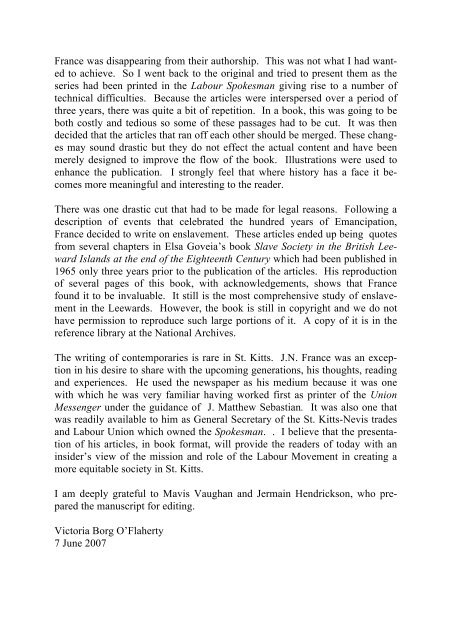JNF-The-Working-Class-Struggle-of-Half-a-Century
You also want an ePaper? Increase the reach of your titles
YUMPU automatically turns print PDFs into web optimized ePapers that Google loves.
France was disappearing from their authorship. This was not what I had wanted<br />
to achieve. So I went back to the original and tried to present them as the<br />
series had been printed in the Labour Spokesman giving rise to a number <strong>of</strong><br />
technical difficulties. Because the articles were interspersed over a period <strong>of</strong><br />
three years, there was quite a bit <strong>of</strong> repetition. In a book, this was going to be<br />
both costly and tedious so some <strong>of</strong> these passages had to be cut. It was then<br />
decided that the articles that ran <strong>of</strong>f each other should be merged. <strong>The</strong>se changes<br />
may sound drastic but they do not effect the actual content and have been<br />
merely designed to improve the flow <strong>of</strong> the book. Illustrations were used to<br />
enhance the publication. I strongly feel that where history has a face it becomes<br />
more meaningful and interesting to the reader.<br />
<strong>The</strong>re was one drastic cut that had to be made for legal reasons. Following a<br />
description <strong>of</strong> events that celebrated the hundred years <strong>of</strong> Emancipation,<br />
France decided to write on enslavement. <strong>The</strong>se articles ended up being quotes<br />
from several chapters in Elsa Goveia’s book Slave Society in the British Leeward<br />
Islands at the end <strong>of</strong> the Eighteenth <strong>Century</strong> which had been published in<br />
1965 only three years prior to the publication <strong>of</strong> the articles. His reproduction<br />
<strong>of</strong> several pages <strong>of</strong> this book, with acknowledgements, shows that France<br />
found it to be invaluable. It still is the most comprehensive study <strong>of</strong> enslavement<br />
in the Leewards. However, the book is still in copyright and we do not<br />
have permission to reproduce such large portions <strong>of</strong> it. A copy <strong>of</strong> it is in the<br />
reference library at the National Archives.<br />
<strong>The</strong> writing <strong>of</strong> contemporaries is rare in St. Kitts. J.N. France was an exception<br />
in his desire to share with the upcoming generations, his thoughts, reading<br />
and experiences. He used the newspaper as his medium because it was one<br />
with which he was very familiar having worked first as printer <strong>of</strong> the Union<br />
Messenger under the guidance <strong>of</strong> J. Matthew Sebastian. It was also one that<br />
was readily available to him as General Secretary <strong>of</strong> the St. Kitts-Nevis trades<br />
and Labour Union which owned the Spokesman. . I believe that the presentation<br />
<strong>of</strong> his articles, in book format, will provide the readers <strong>of</strong> today with an<br />
insider’s view <strong>of</strong> the mission and role <strong>of</strong> the Labour Movement in creating a<br />
more equitable society in St. Kitts.<br />
I am deeply grateful to Mavis Vaughan and Jermain Hendrickson, who prepared<br />
the manuscript for editing.<br />
Victoria Borg O’Flaherty<br />
7 June 2007


